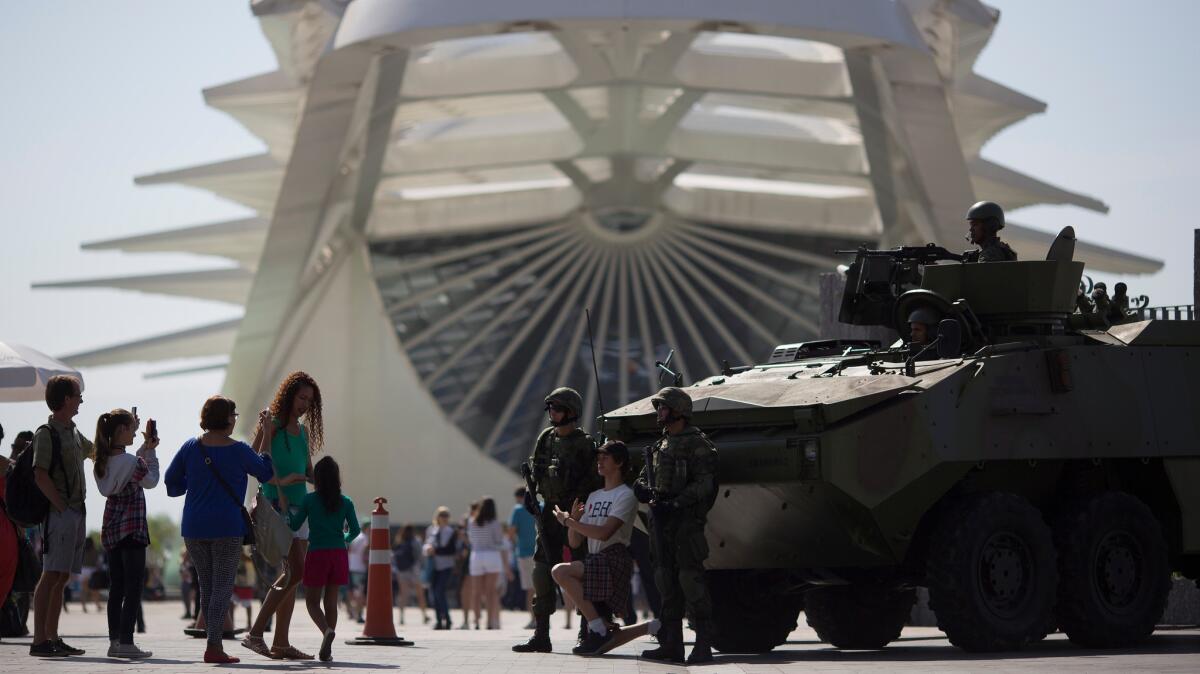Op-Ed: There’s still time L.A. — Just say no to the Olympics

- Share via
The overwhelming news in the lead up to the 2016 Olympics has been about the rampant dysfunction of the host city, Rio de Janeiro, and for good reason. The stories are gruesome and sensationalistic, filled with the kinds of pulpy details that make a mental imprint deeply difficult to dismiss.
There have been police officers greeting people arriving at Rio’s international airport with a banner reading “Welcome to Hell,” as they fight for overtime pay. Body parts have washed onto the beaches where Olympic events are due to take place. The Zika virus is causing a few high-profile athletes to back out of participating.
Some of the stories sound like they’ve been pulled from a ham-handed Hollywood satire. Two skydivers fell to their deaths while attempting, with 26 others, to form the Olympic rings in an effort to hype the Games. A real jaguar, standing in for the Olympic mascot at a torch relay event, was shot dead by a police officer when it escaped its leash after the ceremonies. Or take this slogan from Rio’s Olympic Organizing Committee: A Olimpiada traz mais do que so a Olimpiada. That means “The Olympics bring so much more than just the Olympics.” No kidding.
As bad as the situation is in Rio, all the clucking about its particular problems has a disturbing side-effect: It drives a narrative that the maladies of the Olympics lie with Brazil’s mangled, corrupt government and not with the Olympic system itself. In every recent Games, we’ve seen some version of the worst of the Olympics maladies: debt, displacement and police violence.
Rio is definitely seeing more than its share of these evils. According to a Rio watchdog group, more than 77,000 families have been compelled to move to new homes to make way for Games construction, the Rio Olympics are over budget by 51%, and, as Amnesty International is cataloging, in the last year, there has been a 135% increase in police killings, all focused on the city’s poorest areas.
Since 9/11, security imperatives have provided host cities with a rationale, and possibly a pretext, for investment in high-tech weaponry and surveillance systems. That, in turn, has added to the Games’ cost and added a reason to remove people from their homes: to create a security perimeter for the foreign dignitaries, athletes and the Games venues.
I have covered every Summer Olympics since 2004, and at each site I’ve seen the negative effects. The 2004 Games in Athens brought 50,000 paramilitary troops into the streets and came in at 200% over budget. The Olympic structures now shelter communities of squatters and the homeless, and the cost overruns added to Greece’s catastrophic recession.
In 2008, the Beijing Games displaced an estimated 1.5 million people and cost a then-record $30 billion. The Games’ signature Bird’s Nest stadium is now a mostly empty relic. The 2012 Summer Games in London also went over budget, and put surface-to-air missiles atop residential apartment buildings. In 2014, the Winter Games in Sochi, Russia, cost $51 billion — more than every other Winter Games combined. Roughly $30 billion of this was simply unaccounted for, chalked up to corruption, another common corollary of the Olympic enterprise.
After the extremes of Beijing and Sochi, the International Olympic Committee came up with its Agenda 2020, reforms that were supposed to encourage more economical Games, making them more palatable to smaller cities and governments that have to answer to taxpayers and voters, as opposed to autocracies, such as China and Russia. Any discussion of reform is welcome, but the idea that meaningful safeguards against corruption or human rights abuses have been put in place is laughable.
What every city needs to do — and I’m looking right at you Los Angeles — is just say no. Rejecting the Games is the only action that holds the potential to spur meaningful reform. Then perhaps we’ll see the IOC end the practice of city-by-city bids that encourages high-stakes promises and requires the creation of massive Games infrastructure, often from scratch, every four years. Then perhaps we’ll see the creation of permanent venues for the Winter and Summer Games.
L.A. is in the second phase of making a strong push to host the 2024 Games. The bid organizers maintain that their plan will follow the “no new construction” design that made the 1984 L.A. Games unusually successful, even profitable. It’s worth nothing, however, that a 2012 Oxford University study found that no host city in the previous 20 years had been able to meet its budget.
Even if Angelenos are hopeful that their Games can succeed all over again, there is good reason for the city to rise up and join other cities — from Krakow to Boston — that have actively organized against hosting the Games. Such activism would have an impact well beyond saving Los Angeles from the maladies that inevitably accompany the Games. It’s not too late, and it is the only act that will push the Olympics to change.
Dave Zirin is sports editor of the Nation and author, most recently, of the book “Brazil’s Dance With The Devil: The World Cup, The Olympics, and the Fight for Democracy.”
Follow the Opinion section on Twitter @latimesopinion and Facebook
A cure for the common opinion
Get thought-provoking perspectives with our weekly newsletter.
You may occasionally receive promotional content from the Los Angeles Times.






